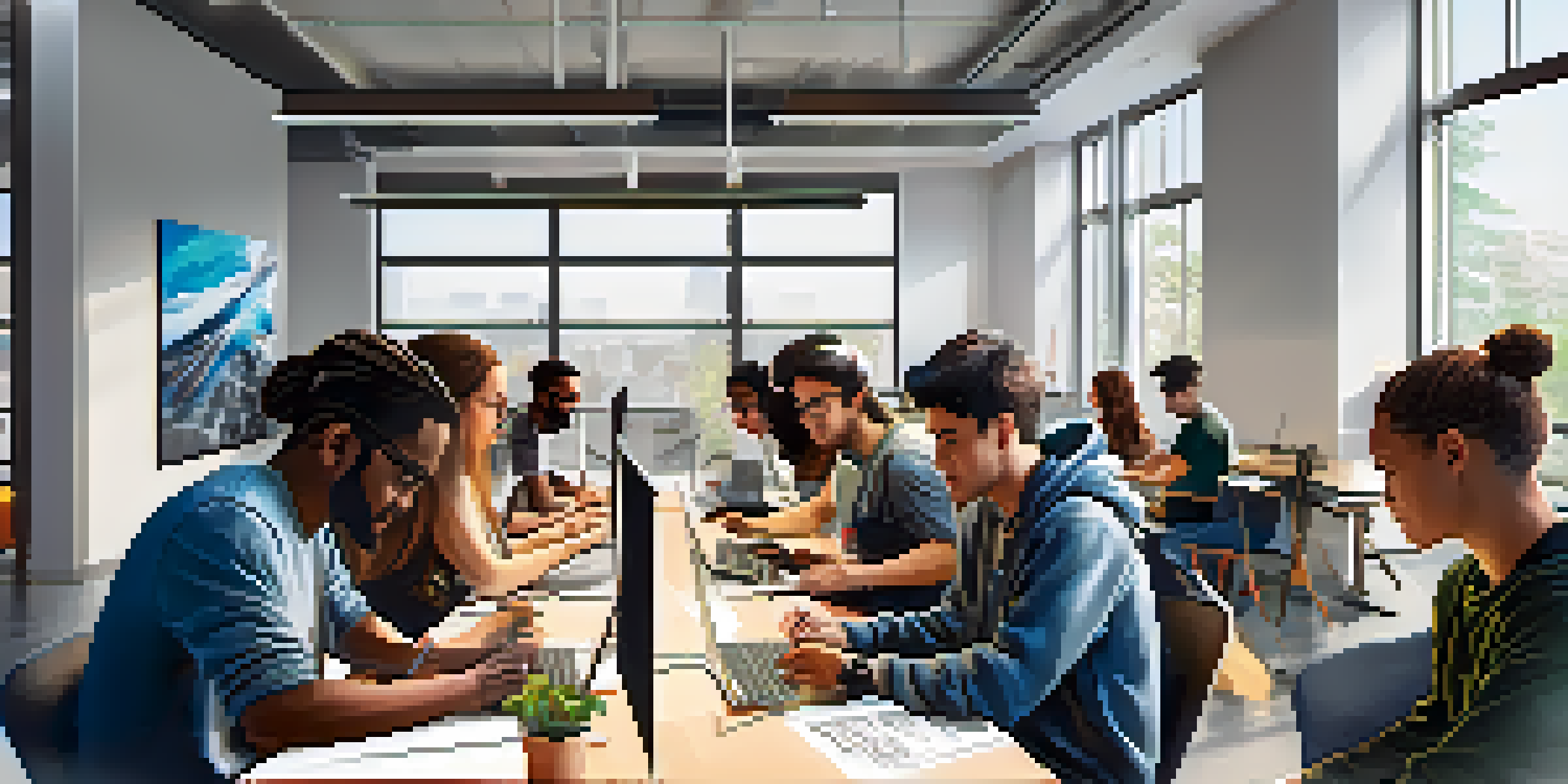The Benefits of Educational Tours for College Students

Enhancing Learning Through Real-World Experiences
Educational tours provide college students with hands-on experiences that textbooks simply can't offer. When students step into a museum, historical site, or corporate environment, they engage with the material in a dynamic way. This real-world exposure reinforces classroom lessons, making complex concepts easier to grasp.
The only source of knowledge is experience.
For instance, a biology student visiting a botanical garden can see plant species up close, deepening their understanding of ecosystems. Such experiences ignite curiosity and foster a deeper appreciation for the subject matter. Ultimately, this experiential learning approach helps students connect theory to practice.
Moreover, educational tours often spark interest in fields students might not have considered. By witnessing professionals in action and exploring different environments, students can discover new passions and career paths, enriching their educational journey.
Building Critical Thinking and Problem-Solving Skills
Educational tours challenge students to think critically and solve problems in real time. Unlike traditional classroom settings, where students might passively absorb information, tours often require active engagement. Students may be tasked with solving real-world challenges or engaging in discussions that promote analytical thinking.

For example, a tour of a tech company might involve a workshop where students brainstorm solutions to a project. This not only enhances their critical thinking skills but also encourages collaboration and communication among peers. Such skills are invaluable in today’s job market, where employers seek adaptable and innovative thinkers.
Real-World Learning Enhances Education
Educational tours provide hands-on experiences that connect classroom theory to practical applications.
By immersing themselves in these environments, students learn to approach problems with a hands-on mindset. This practical experience helps them navigate future challenges both academically and professionally.
Fostering Personal Development and Independence
Educational tours often push students out of their comfort zones, encouraging personal growth and independence. Traveling to new locations and interacting with diverse groups can boost self-confidence and social skills. It’s an opportunity for students to learn how to navigate unfamiliar situations and build resilience.
Education is not the learning of facts, but the training of the mind to think.
For instance, a student traveling abroad for a history tour may have to adapt to different cultures and practices. These experiences not only broaden their perspectives but also teach valuable life skills such as adaptability and open-mindedness. Over time, these qualities contribute to a more well-rounded individual.
Additionally, students who embark on educational tours often return with a sense of achievement. Overcoming challenges during their journey instills a sense of accomplishment that can motivate them in their future academic and personal endeavors.
Encouraging Teamwork and Collaboration
One of the significant benefits of educational tours is the emphasis on teamwork and collaboration. Many tours involve group activities that require students to work together towards common goals. This collaborative environment fosters camaraderie and helps students build lasting friendships.
For example, a group project during a science tour might involve conducting experiments and presenting findings. Such teamwork not only enhances learning but also mirrors workplace dynamics where collaboration is key. Students learn to appreciate diverse viewpoints and develop their interpersonal skills.
Cultivating Essential Skills
Tours promote critical thinking, teamwork, and problem-solving, preparing students for real-world challenges.
Furthermore, these shared experiences often lead to a supportive network that can benefit students long after the tour ends. The bonds formed during educational tours can translate into valuable connections in their academic and professional lives.
Expanding Cultural Awareness and Sensitivity
Educational tours are a fantastic way for college students to immerse themselves in different cultures. By visiting various locations, students can experience firsthand the rich diversity that exists in the world. This exposure encourages cultural sensitivity and a deeper understanding of global issues.
For instance, a tour to an art gallery featuring international artists can provide insights into different cultural perspectives. Engaging with local communities and traditions helps students appreciate the nuances of other lifestyles. This understanding can be pivotal in fostering empathy and respect among individuals from different backgrounds.
In today’s interconnected world, cultural awareness is more important than ever. Students who travel and learn about different cultures often become more informed global citizens, ready to engage thoughtfully in diverse environments.
Enhancing Career Readiness and Networking Opportunities
Participating in educational tours can significantly enhance career readiness for college students. Many tours include visits to organizations, allowing students to observe professionals in their field of interest. This firsthand exposure can provide insights into career paths and the skills required to succeed.
For example, a business student visiting a startup may gain valuable insights into entrepreneurship and innovation. Additionally, these tours often open doors to networking opportunities, connecting students with industry professionals. Building these relationships can lead to internships, mentorship, and job opportunities down the line.
Building Cultural Awareness
Experiencing diverse cultures fosters empathy and global citizenship among students.
Furthermore, developing a professional network while still in college can give students a competitive edge. They learn not just from their experiences, but also from the experiences of others, paving the way for future success.
Boosting Motivation and Engagement in Learning
Educational tours can reignite a student's passion for learning by breaking the monotony of traditional classroom settings. The excitement of visiting new places and experiencing different learning environments can be incredibly motivating. Students often return more engaged and enthusiastic about their studies after a tour.
For instance, a literature class visiting a local theater for a live performance may inspire students to delve deeper into the text. Such experiences make learning feel relevant and alive, encouraging students to participate more actively in class discussions. This increased engagement can lead to better academic performance.

Moreover, the joy of exploring and learning in a fun environment often fosters a lifelong love for education. Students who enjoy their learning experiences are more likely to pursue knowledge beyond the classroom, cultivating a growth mindset.
Conclusion: The Lasting Impact of Educational Tours
In conclusion, educational tours offer a multitude of benefits for college students that extend beyond the classroom. They enhance learning through real-world experiences, foster critical thinking, and encourage personal growth. These tours not only enrich students academically but also socially and professionally.
By stepping out of their usual environments, students gain invaluable skills and insights that can shape their futures. Whether it’s through collaboration, cultural exposure, or career networking, the lessons learned on these tours often leave a lasting impact.
Ultimately, educational tours are more than just trips; they are transformative experiences that prepare students for success in an ever-evolving world.